
The ‘L’ Word. Leadership is Not a Dirty Word.
Perbi Executive Leadership Education (PELÉ) just concluded a successful co-hosting of the annual John Maxwell Team conference dubbed Live2Lead in Accra. Corporate, non-profit and other leaders in Ghana experienced in real-time, via simulcast, the motions colleagues in Atlanta, Georgia were also going through in the United States. Live2Lead. Live is an ‘L’ word, so is Lead. Yet Google “The ‘L’ Word” and you are more likely to be greeted with Lesbian or even Los Angeles and not Lead(ership). In fact, a certain Showtime drama series that depicts these other L’s and aired in the first decade of this century dominates the internet should you conduct “the ‘L’ word” phrase search.
For us at PELÉ, Leadership is the ‘L’ word. If Dr. John C. Maxwell is right that “leaders see everything with a leadership bias,” then is it any wonder? This is incredibly important to us in our quest to form a global ecosystem of authentic leaders that in our DeepLEADTM courses, the first of all 24 modules (in a three-part series comprising eight modules each) is actually entitled “The ‘L’ Word.” We LOVE Leadership.
Some associate leadership with politics and because “politics is dirty” leadership gets a bad rap; leadership then becomes a dirty word and a dirty thing. Politics, like any other worthwhile thing, can be dirty. But even when and where it is true that “politics is dirty,” leadership is bigger than politics. In fact, our founding principal at PELÉ is on record to have said that “leadership is too important to leave it to politicians alone.” Similarly, because “Gen Z doesn’t do hierarchy,” the current rejection of twentieth century ‘command and control’ and ‘authoritarian’ leadership to rather embrace a flatter perception of the leader—plus the notion of twenty-first century ‘distributed leadership’—also tends to make the word ‘leadership’ undesirable, even demonized in some quarters today. For many, leaders and leadership have had a bad rap, a negative reputation, hence the title and subtitle of the first of our DeepLEADTM modules, The ‘L’ Word—Leadership is not a dirty word, with the wild hope to change that narrative in the head and heart of anyone who cares to pay attention. We establish the paradigm that the current rejection of twentieth century ‘command and control’ and ‘authoritarian’ leadership and the embracing of a flatter perception of the leader plus and distributed leadership does not exclude how vital leadership is and what it can/cannot do.
‘O’ for Objectives
While the overall aim of the DeepLEADTM Growth Series is “to establish an indisputable link between the person of the leader—including their self-awareness, life story, character, temperament, habits, emotional health—and the success of leadership,” the specific objectives of The “L’ Word module include exposing students to the wide array of leadership opinions and definitions to appreciate the breath and nuance of the ‘L’ subject. By the end of the course, one would’ve laid “the foundation for the topic of leadership in a memorable and definitive way for not just the course itself but for all of life.” While one would’ve compared and contrasted two dozen leadership definitions and descriptions, studied a 200-year panorama of leadership paradigms from the Great Man Theory of the 1800s to Authentic Leadership or Adaptive Leadership of the first and second decades of this century respectively, there’s an all-encompassing Dr. Yaw Perbi definition of a leader, which we use throughout the course and in our engagements with clients.
‘D’ for Definitions
It has been interesting observing the definitions and descriptions of leadership that have most caught the attention and strummed the heartstrings of the October 2023 cohort of the DeepLEADTM live Masterclass. Already, the fact that DeepLEADTM embraces complexity, straddles paradigms and tames tensions is forming these in them as they grapple with definitions that even seem contradictory, like Mandela’s shepherd paradigm of leading from behind and fellow Noble Prize laureate Mott’s whose definition of leadership is being in front and staying ahead! Here’s John R. Mott (Nobel Peace Prize laureate 1946): “Leaders are people who know the road, and who can keep ahead, and who can pull others after them.” Here comes Nelson R. Mandela (Nobel Peace Prize laureate 1993): “A leader…is like a shepherd. He stays behind the flock, letting the most nimble go out ahead, whereupon the others follow, not realizing that all along they are being directed from behind.” The DeepLEADer has the wisdom to know when and where to be ahead or lead from behind.
Whether it’s the leadership theories, descriptions or definitions in The ‘L’ Word module, by the end of it leaders undergoing it would realize that no one theory, description or definition is enough to explain all of leadership. Warren Bennis captures the nuance and complexity of the ‘L’ word well when he asserts, “Like love, leadership is something that everybody knows exists, but no one can define…” No wonder, he explains, “decades of academic analysis have given us more than 350 definitions of leadership.”
Conclusion
What dominates our minds when it comes to “the ‘L’ word” is miles apart from what populates a typical Google search today. But Leadership is the ‘L’ word. And it is incredibly important, as strongly put in the DeepLEADTM series, that because “everything rises and falls on leadership” and “leadership is cause, everything else is effect,” one day, eventually, Leadership will get the most results in an internet search for “the ‘L’ word.” In the course we state, and it bears repeating, that “Whether in normal times or unusual ones, the tenets and principles of great leadership ought to be passed on to each generation.” So no matter what letters we assign to the generations–X, Y, Z, Alpha, whatever–that in each and every generation, the ‘L’ word would be Leadership. That’s what we live for, why we’re here. We live to lead.
Post Script
DeepLEADTM is for any leader seeking profound, authentic transformation—of self, systems & society—that lasts. There is a live DeepLEADTM Masterclass currently ongoing. Watch out for the launch of the online pre-recorded, self-paced version in December 2023.
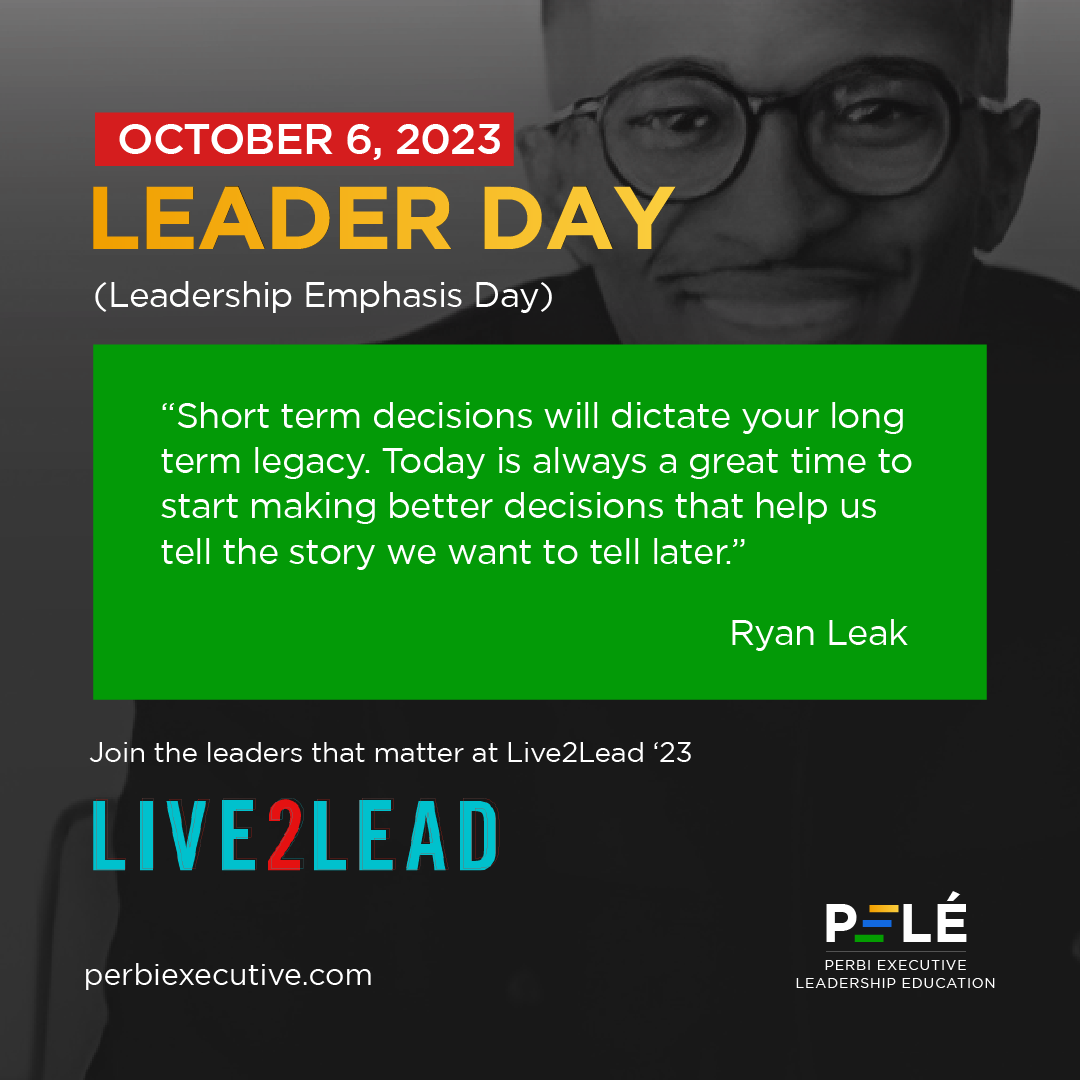
Today is Leader Day. You Don’t Want to Miss the Inspirational Ryan Leak!
Meet Author, speaker, executive coach and film maker, Ryan Leak. Ryan is known for two documentaries, The Surprise Wedding and Chasing Failure. As CEO of a leadership development firm based in Dallas, Texas, Mr. Leak and his team train over 15,000 leaders every year–from Fortune 500 companies to professional sports teams.
Ryan’s passion is helping leaders push past autopilot and level up in their lives and careers. He spreads this empowering message through coaching, speaking, and leveraging the power of video to reach thousands through his online platforms.
As author of the USA Today bestselling book, Chasing Failure, and the Wall Street Journal bestselling book Leveling Up, Ryan and his work have been featured in dozens of media outlets, including Good Morning America and the Today Show.
Mr. Leak is widely known for that one time he planned a viral proposal and wedding on the same day. Most importantly, Ryan is married to his best friend, Amanda, and is the proud assistant coach for his son’s basketball team.
LEAK LIVE AT MAXWELL’S LIVE2LEAD ANNUAL CONFERENCE 2023
Today, the first Friday in October, is LEADER DAY (Leadership Emphasis Day). It is marked by the annual Live2Lead Ghana conference, a brainchild of Dr. John C. Maxwell. And this year, the inspirational Ryan Leak is speaking! You don’t want to miss him. As Perbi Executive Leadership Education (PELE), we have been privileged to host Live2Lead on both sides of the Atlantic, in Montreal, Canada as well as in Accra, Ghana. We are absolutely convinced that leadership is taught; not just caught. Join John and the stellar faculty he’s put together for this year’s Live2Lead conference and up your leadership game.
This year, together with our partners in Ghana, we’ve chosen the theme, “Leading for Legacy.” On legacy, here’s what Ryan Leak’s got to say: “short term decisions will dictate your long term legacy. Today is always a great time to start making better decisions that help us tell the story we want to tell later.” Legacy doesn’t just happen; it’s by intentional, intelligent design. Come and find out how, in-person at the Ecobank Ghana Headquarters in Accra, or online, wherever in the world you might be!
Today, October 6, is Leader Day this year. Register now through this link. Impress upon your organization to join the Leadership Emphasis Day/Leader Day movement that will transform society by becoming a Patron of Live2Lead. A Patron company or individual is one that sends at least 10 leaders to Live2Lead. Together we can change our world for the better! Yes, we can!
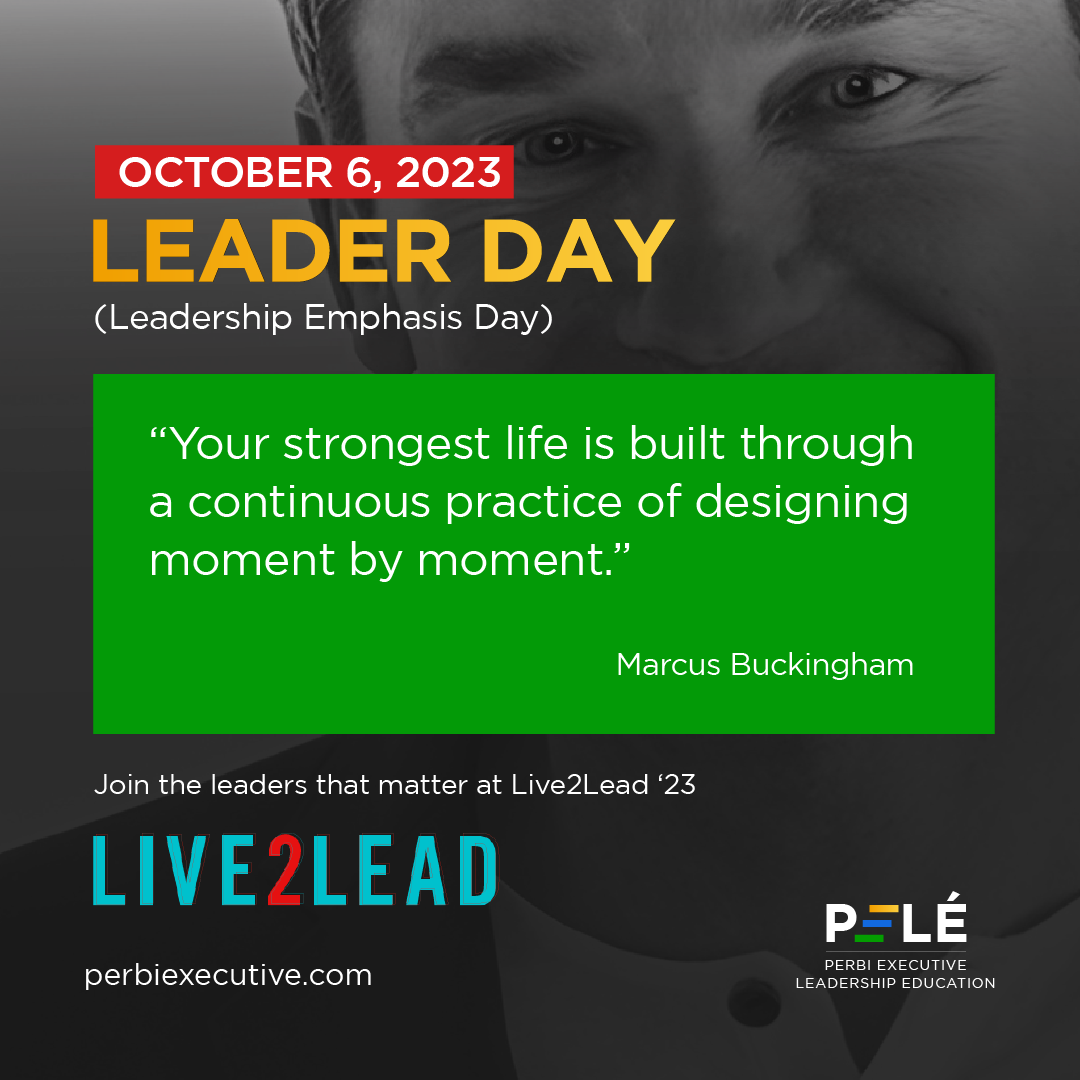
Meet Motivational Marcus Buckingham, Master of Strengths
British best-selling book-writer and arguably “the world’s most prominent researcher on strengths, leadership and high-performance at work,” Marcus Wilfrid Buckingham, is a remarkable individual. If you’ve ever heard of Strengthsfinder, or better still, taken the phenomenal assessment, behold the co-genius behind it! Renowned for his outstanding contributions to the world of work and the fields of technology, innovation, and philanthropy, Buckingham is a global researcher and New York Times best-selling author focused on unlocking strengths, increasing performance, and pioneering the future of how people work. He is the author of two of the best-selling business books of all time, First, Break All the Rules (1999), and Now, Discover Your Strengths (2001), and his tenth book, Love + Work (Harvard Business Review Press, 2022) is a Wall Street Journal bestseller and has been heralded by Forbes as one of the ten must-reads for career and leadership. Marcus’ 2019 Harvard Business Review (HBR) cover article, “The Feedback Fallacy,” was selected by HBR as one of the most influential articles of the last 100 years, and Marcus’ strengths assessments have been taken by over 10 million people worldwide.
Born 1966 in Buckinghamshire in Britain, Marcus displayed an innate curiosity and passion for technology from a young age. After completing his formal education at Cambridge in computer science, Marcus co-founded a startup in the late 1990s that revolutionized the way people interacted with online content. The company’s groundbreaking platform garnered widespread attention and accolades, propelling Marcus into the limelight as a visionary tech entrepreneur. Throughout his career, Marcus remained at the forefront of technological advancements, leading numerous successful ventures and launching groundbreaking products that transformed industries. His dedication to innovation and his ability to anticipate market trends earned him a reputation as one of the foremost technology pioneers of his time.
Beyond his professional accomplishments, Marcus Buckingham has always been deeply committed to making a positive impact on society. He is renowned for his philanthropic efforts, actively supporting various causes related to education, healthcare, and environmental sustainability. Marcus firmly believes in using his wealth and influence to drive positive change and has donated generously to charities and initiatives around the globe. In addition to his philanthropy, Marcus has been an advocate for promoting diversity and inclusivity within the tech industry.
In addition to the self-published short film series Trombone Player Wanted, Buckingham has made numerous television appearances on US television networks and cable channels including The View on ABC, I Want to Work for Diddy on VH1, The Oprah Winfrey Show on syndication, Good Morning America on ABC and The Jane Pauley Show. Marcus Wilfrid Buckingham the English research-based motivational speaker and business consultant is based in California, USA.
BUCKINGHAM LIVE AT MAXWELL’S LIVE2LEAD ANNUAL CONFERENCE 2023
Marcus Buckingham speaks at this year’s annual Live2Lead Ghana, a brainchild of Dr. John C. Maxwell. As Perbi Executive Leadership Education (PELE), we have been privileged to host Live2Lead on both sides of the Atlantic, in Montreal, Canada as well as in Accra, Ghana. We are absolutely convinced that leadership is taught; not just caught. Join John and the stellar faculty he’s put together for this year’s Live2Lead conference and up your leadership game.
This year, together with our partners in Ghana, we’ve chosen the theme, “Leading for Legacy.” Here’s a taste of Marcus Buckingham’s take on legacy: “Your strongest life is built through a continuous practice of designing moment by moment.” Legacy doesn’t just happen; it’s by intentional, intelligent design. Come and find out how, in-person at the Ecobank Ghana Headquarters in Accra, or online, wherever in the world you might be!
October 6 is Leader Day this year. Register now through this link. Impress upon your organization to join the Leadership Emphasis Day/Leader Day movement that will transform society by becoming a Patron of Live2Lead. A Patron company or individual is one that sends at least 10 leaders to Live2Lead. Together we can change our world for the better! Yes, we can!
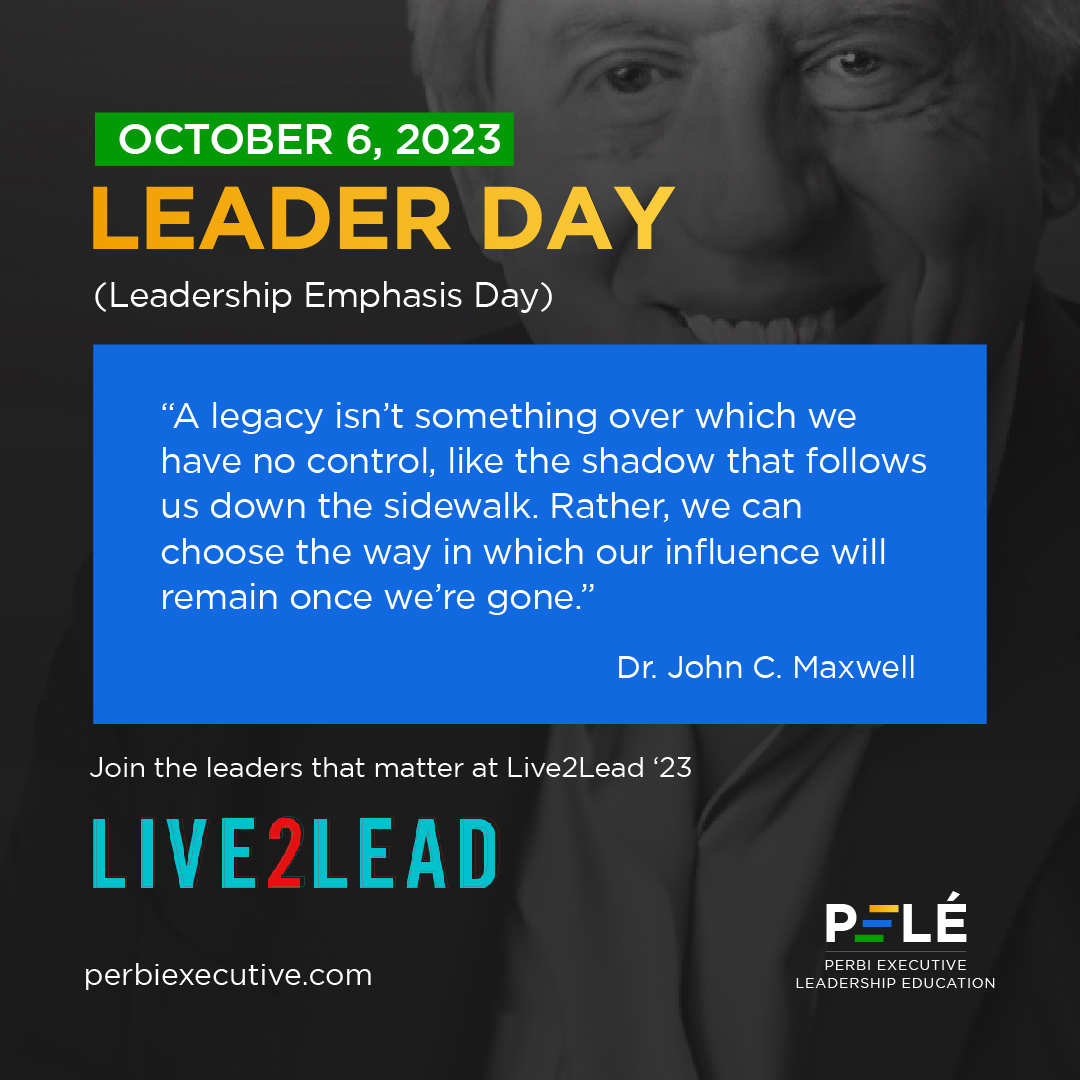
Meet Mentor-in-Chief, Dr. John C. Maxwell
No single individual has influenced leadership paradigms and praxes in the last four decades like Dr. John C. Maxwell. One would have to convincingly argue otherwise with a long list of millions of people on every continent of the planet whose patronage has inadvertently crowned Maxwell a #1 New York Times bestselling author, coach, and speaker multiple times over. With more than 30 million books sold, John has been identified as the #1 leader in business by the American Management Association® and as the world’s most influential leadership expert by Business Insider and Inc. magazines.
Dr. Maxwell has also received the Horatio Alger Award, as well as the Mother Teresa Prize for Global Peace and Leadership from the Luminary Leadership Network. His organizations—The John Maxwell Company, The John Maxwell Team, EQUIP, and the John Maxwell Leadership Foundation—have trained millions of leaders from every nation in the world.
In the late 1990s, The HuD Group, which we are proudly affiliated with, started understudying and teaching his opus magnus, The 21 Irrefutable Laws of Leadership, and hasn’t turned back since. At the Perbi Executive Leadership Education (PELE) company, our Principal and a number of our coaches are certified Maxwell coaches, speakers, trainers on the worldwide John Maxwell Team (JMT).
MAXWELL’S LIVE2LEAD ANNUAL CONFERENCE
The annual Live2Lead conference is John’s brainchild, and he always opens and closes, with other phenomenal faculty sandwiched in between. As PELE, we have been privileged to host it on both sides of the Atlantic, in Montreal, Canada as well as in Accra, Ghana. We are absolutely convinced that leadership is taught; not just caught. Join John and the stellar faculty he’s put together for this year’s Live2Lead conference and up your leadership game.
This year, together with our partners in Ghana we’ve chosen the theme, Leading for Legacy. Here’s John’s take on it: “A legacy isn’t something over which we have no control, like the shadow that follows us down the sidewalk. Rather, we can choose the way in which our influence will remain once we’re gone.” Come and find out how!
Register now through this link. Impress upon your organization to join the Leadership Emphasis Day/Leader Day movement that will transform society by becoming a Patron of Live2Lead. A Patron company or individual is one that sends at least 10 leaders to Live2Lead. Together we can change our world for the better! Yes we can!
Register HERE, NOW.
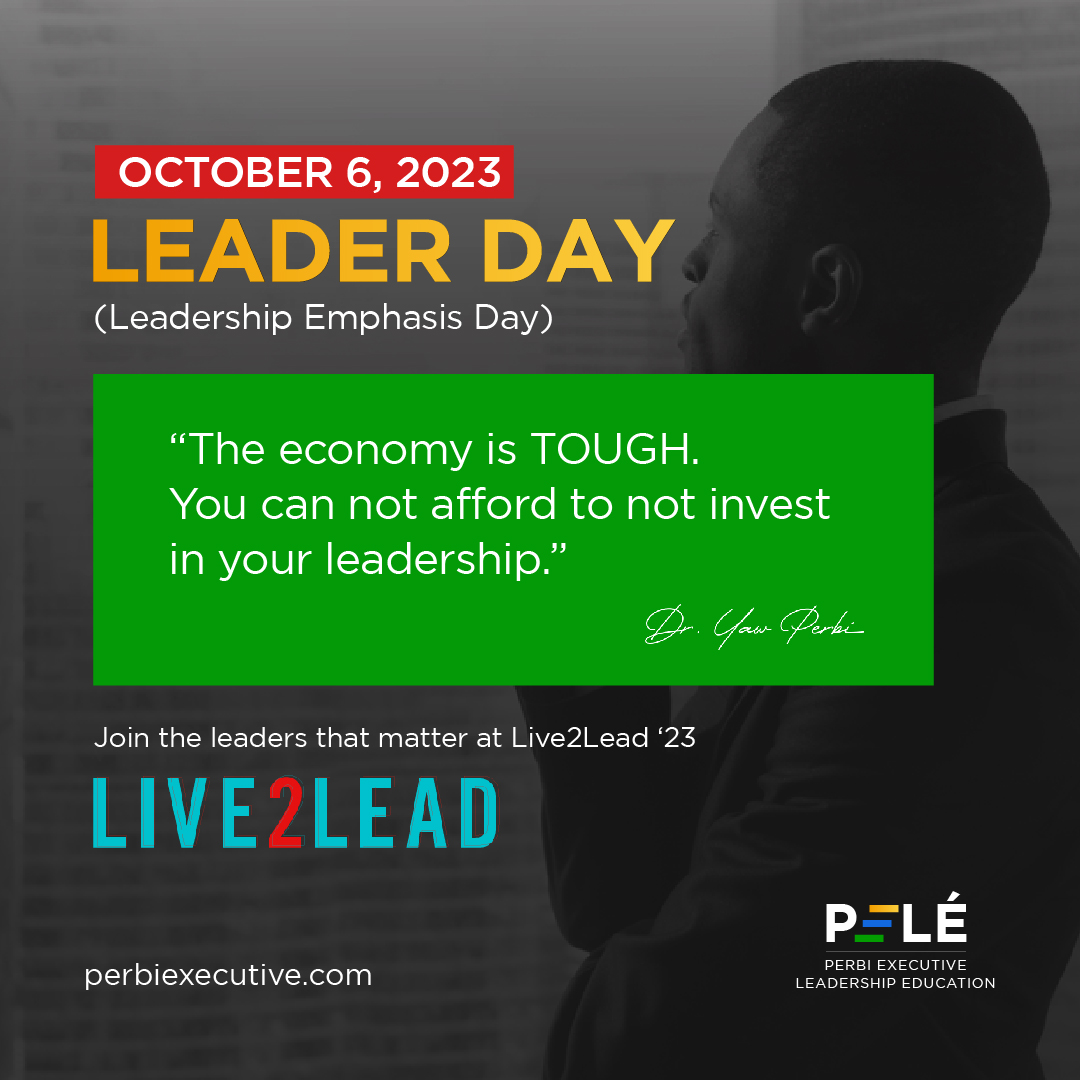
Live2Lead 2023: Leader Day Comes Again This Year.
There was recently a humorous corporate piece where the smart CFO said to the CEO, “We can’t afford to invest all this money developing our leaders. What if they leave?”
To which the wiser CEO replied, rather curtly, “What if we don’t invest in our leaders and they stay?”
You would think that “because the economy is tough let’s hold off the ‘luxury’ of leadership development” yet the irony is that precisely because the economy is tough you cannot afford not to grow your leadership to overcome the challenge and soar to new heights. What if the economy isn’t going to get better anytime soon. Will you survive? How will you survive, let alone thrive, if you don’t get better than you are now and better than the economy you live in?
THE FRUSTRATION LIVES ON, BUT SO DOES THE DREAM
Last year, my frustration was that “there is a day dedicated to almost every cause under the sun and pretty much each of the Sustainable Development Goals (SDGs)—women’s day, water day, literacy day, friendship day, founders’ day … even toilet day. Yet the one thing that causes each of these matters to rise or fall has no such day dedicated to it to elevate and emphasize it. Even then, is a day enough? Surely not; but it is a good catalyst for the remaining three hundred and sixty four (or five) days,” I said.
Last year, I shared a dream that “the first Friday of October each year will become universally known as LEADER DAY.” It bears repeating that, “There is nothing special about the first Friday in October per se except that consistently for about a decade now, our mentor and leadership expert, John C. Maxwell, has been gathering some of the best leadership minds and hearts on the planet to speak to the issue, and we might as well leverage the opportunity rather than reinvent the wheel. Live2Lead is the name of that event. The name says it all, that’s our purpose on earth: We live to lead.”
We held a successful event last year, only online, looking at the theme “Leading with Integrity & Inspiring Hope, for the Common Good.” To say Patrick Awuah (Founder & CEO, Ashesi University), Patricia Obo-Nai (CEO, Vodafone), James Ebo Whyte (CEO, Roverman Productions), Gwen Gyimah Addo (CEO, The Hair Senta), and Kathleen Addo (Chairperson, National Council for Civic Education) were phenomenal resource persons is an understatement. We will bring you snippets, in text and video, of what they shared to remind and stimulate you towards integrity and hope for your leadership.
LEGACY THIS TIME
This year, two more John C. Maxwell-trained and certified colleagues in Ghana have joined our trio of 2022 to pour more fire into the dream that ultimately the first Friday of October each year will become universally known as LEADER DAY. We have settled on ‘Leadership Legacy’ as the theme and will soon be outdooring the slate of speakers, including my celebrated German-trained professor of Cardiosurgery when I was a medical student at the University of Ghana Medical School. We’ve got to live to lead today, for the sake of lives tomorrow. That’s legacy.
You and I know too well the dearth of leadership in our country and around the world, whose ripple effect is the tough economic situation we find ourselves in, and more. We hope to double last year’s number of attendees–this time both online and in-person at the Ecobank Ghana headquarters auditorium–to benefit from the LIVE simulcast from Atlanta and the local content for our context, sandwiching the global feed.
CONCLUSION
When leaders get better, everything and everyone gets better too. There is no benefit of not investing in your leadership to get better because the economy is tough. Ironically, the only way out is for you and everyone else to invest in our leadership development to get better. That is the tide the raises all the boats with it, including the economy. In the words of the charming African-American poet Maya Angelou, “Do the best you can until you know better. Then when you know better, do better.” Mark down Leader Day 2023, October 6, to know better, get better and do better.
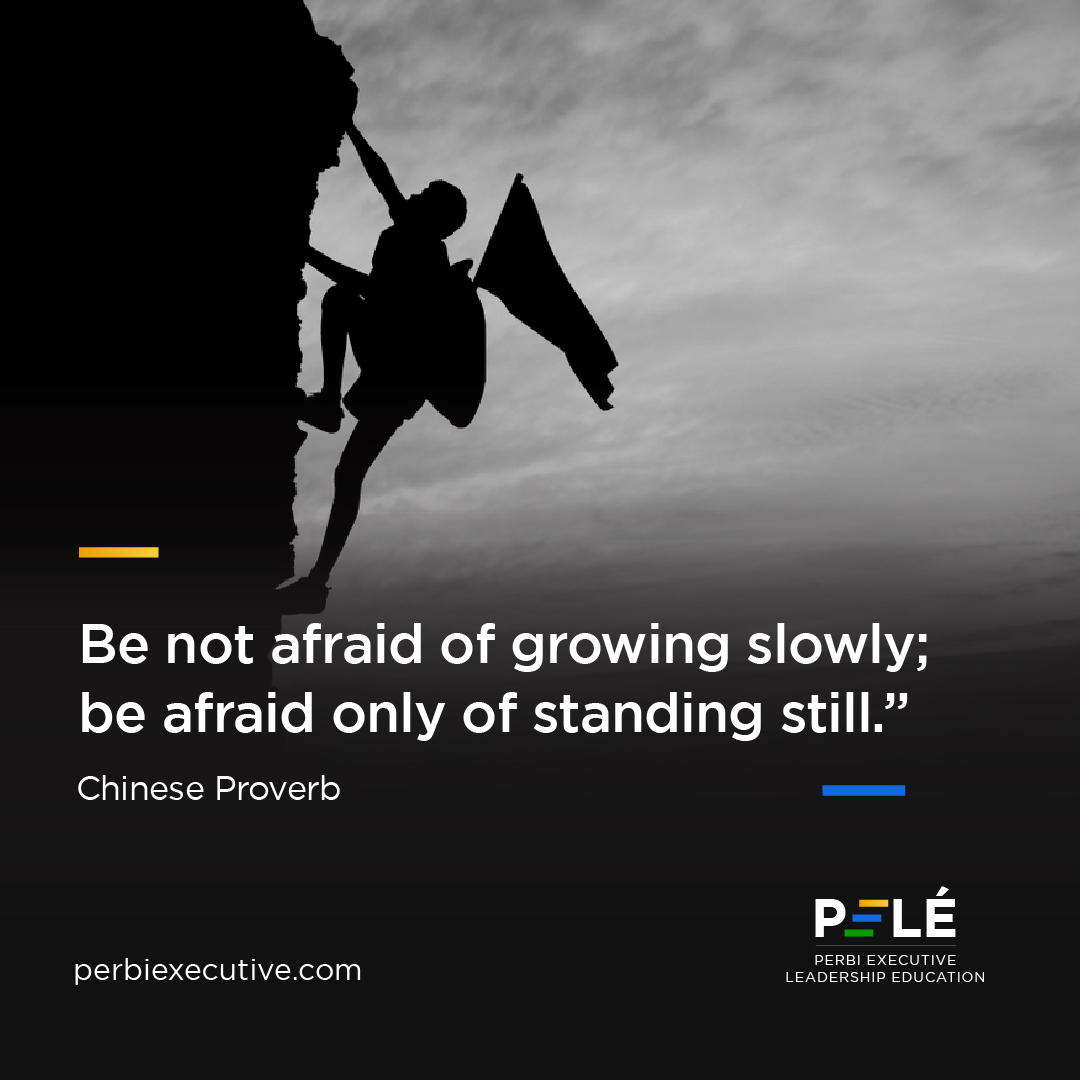
Big Events are Overrated, Trust Process.
“Trust the process” has become cliché. Yet many don’t understand it, let alone mean it. In fact, most people are more attracted to big events and striking occasions but the aim of this article is to show that these are overrated. We are attracted to the big bang, amazing testimonies, the one time lottery win, that miracle… all of which are good but in the long term, those are not the things that sustain societies, grow businesses or deeply transform us long term. It is process, process, process.
MENTORING AND THE LAW OF PROCESS THEN
These thoughts have been coming to mind over the last couple of weeks because of two recent incidents, one in the church and one in the corporate setting. Regarding the former, l led part of an annual discipleship capacity building workshop for my local church at the University of Ghana. Discipleship is the word Christians use for spiritual mentorship. I inquired what they would do if they were God and came on Earth in the person of Jesus Christ (as Christians believe) to do an effectual job of changing the world. What would they do?
Well, many would go head-on and prioritize filling stadia with people (and there were stadia in the time of Jesus) or fill the plains like where he fed 5,000 then 4,000 (not counting women and children) day after day, as the rule not the exception. Some would constantly go to the royal palace and do some leadership workshops for Herod and his ilk etc. But the Rabbi did none of that routinely. First of all, He took 30 years to prepare Himself from conception through childhood to turbulent youth years to adulthood. He came as a foetus, endured nine months of pregnancy and went through a 30-year process of learning–of obeying His parents, of apprenticing to be a carpenter like His earthly dad, of learning the Torah like other children of His day etc. Yes, all of that. Process.
Eventually when it was time to launch His ministry at 30 (phew! finally!) what does He do? Nothing prime-time TV worthy (oh, of course apart from His spectacular baptism). The baptism in the Jordan by Cousin John was a big event. But the rest, again, process. After all-night prayer, He goes around town and handpicks 12 people, just a dozen, and decides to walk with them, life-on-life, for three-and-a-half years. As Professor Robert Coleman points out in his magnum opus, His method of training was His life itself, it wasn’t just “read this book.” No! Process, day by day by day by day by day for nearly as long as we have to wait for the next Olympics or World Cup tournament.
Only a few years down the line these ordinary fisherfolk so got Him that each was martyred for what they had come to see and taste and know. In a few years, it was reported of His followers, “the people that have turned the world upside down.” Two thousand years later, what do we see? There are 2. 3 billion Christ followers on every continent and in every country and geopolitical space today. Yet the original leader Himself never travelled beyond 50-100 km radius of where he was born. The farthest he went to was Egypt, in His childhood, when his family temporarily migrated to Africa as refugees. Why this impact? How? The law of process.
He knew if he took 12, focused on the few and worked on them life-on-life for years, that the few would bring another few who would bring a few more, who would mentor a few, who would bring a few and over years this kind of impact would happen. Deep transformation doesn’t happen in rows, like we sit in events, but in circles. It happens in circles, small groups, day by day, week after week, month after month.
MENTORING AND THE LAW OF PROCESS NOW
At the said workshop at the University of Ghana, I showed the attendees a simulation: if one person who comes has a relationship with the Lord Jesus Christ decides to disciple another person, just one person per year, life on life, week by week, studying scriptures, eating together, praying together, travelling to places together etc. Just a person a year. At the end of the first year, there would be only two disciples of Jesus. The original then instructs the ‘graduating’ disciple to do same for another, just as Paul admonished Timothy: “And the things that you have heard from me among many witnesses, commit these to faithful men who will be able to teach others also” (2 Timothy 2:2 , NKJV).
At the end of the second year what happens? You still mentor a second person so there are two of you. But the original person you discipled in the first year has now also discipled somebody else, thus there are four of you. First year it was just addition, the second year there was multiplication. By the third year and onwards, there isn’t just multiplication but exponential multiplication. And if it continues like that, just one person each annually, by the end of the tenth year, you would be over a 1000 people (quantitatively impressive) deeply transformed (qualitatively impactful). You’ve gotten the mass that you wanted, yes, a thousand people you would have wanted to fill an auditorium with to impact all at once (but would leave the program and achieve nothing). Now you’ve gotten that same 1,000 people after a decade but they would be solid movers and shaker.. It may seem inefficient at first but it is deeply effective and with time it becomes powerfully efficient as well. Within 10 years, you would have a 1000 people who are deeply transformed and now you also have the numbers. That’s the law of process.
MONEY AND THE LAW OF PROCESS NOW & THEN
Then, about the training for the core leadership team at Perbi Cubs we talked about how leadership is built day in and day out and not in a day. John Maxwell talks about that as the fourth ‘irrefutable law’ in his New York bestselling book, The 21 Irrefutable Laws of Leadership. I have been teaching this book for over 20 years now. “Leadership is built daily and not in a day,” Dr. Maxwell says. So is anything else of enduring value. Daily; not in a day.
To illustrate, I actually showed the EdTech leaders an investment chart I created a couple of decades ago in my book Financial Whizzdom, comparing a youth who starts investing at 20 and his uncle who starts investing at 30. Both invest the same amount (say GHS 2,000) at the same annual interest rate of 10% p.a. The lad invests for 10 years, stops investing but leaves the money to keep growing. The uncle who started at 30 doesn’t stop and continues putting in GHS, 2,000 every year till the age of 65. At the age of 65, this boy who started and stopped and just let his money keep growing would have more money, about GHS 200,000 more, than his uncle. All because the young man started earlier and got the Law of Process working for him a whole decade prior.
CONCLUSION
Process works. It gives sure and deep and lasting results. Don’t skip processes. Build your leadership daily. Build your spiritual life daily. Build your health daily. Build your intellectual capacity with a little reading everyday rather than just binging once or twice a year. Something you are doing everyday is determining your future. Or as Tag Short put it, “the secret of success is found in your daily agenda.” A related Chinese proverb really intrigues me. Here’s my paraphrase: “Do not fear growing slowly, what you should fear is standing still, not growing at all.” Trust the process. Truly, trust process. Process would beat big events and one-time shiny experiences any day, all day, long-term. It’s a timeless, universal truth. Trust it.
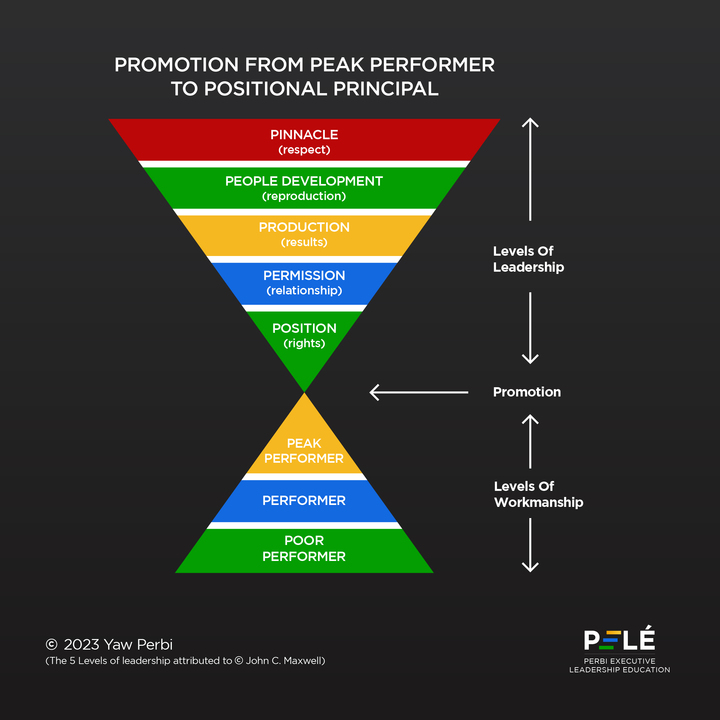
The Best Promotions are the Worst.
Here’s the worst thing about the best promotion. At one of my organizations, we recently had to let an excellent hire go. Come to think of it, we failed him. We failed him by promoting him.
You would think that all promotions are good but no. One of the worst kinds is being ‘elevated’ to become a leader just because you are an outstanding worker or producer. Working on stuff and excelling is very different from working with souls to excel. The reward for hard work is more work, weird yes, but the latter tends to be more mental work than manual —which most people find as more beneficial—also, more of working with people than working on things.
As one person shared about struggling with leadership upon her first promotion as a telco manager: “Within one month, I went from being the best programmer to the worst supervisor.” I’ve seen this happen to too many people in too many places. I grew up on the University of Ghana campus (both my grandfather and mother were professors there) and I would see time and time again fine lecturers promoted into leadership positions, from heads of department through deanship to vice-chancellorship and flail and fail. How many times have I said that a great chemist or erudite historian doesn’t necessarily make a great leader!
We do the same in the medical world, promoting top surgeons to head departments or if God doesn’t intervene, to head the hospital! When I was promoted to supervise the Military Polyclinic at the 37 Military Hospital in Accra, determining the doctors scheduling and all, in my opinion it was only because I wasn’t a bad doctor and had been around long enough. And no one gave me a minute’s training about leadership. Squat. Thank God I had been a private student of leadership for years prior.
It doesn’t start out as a bad thing; in fact, it is exhilarating at first for the recipient of the promotion. And the giver of the opportunity ordinarily also means well and feels good about it. But organizational leaders need to rethink the notion of making people supervisors, managers or leaders as a reward for diligent or even skillful individual technical work. It can backfire, seriously.
A STORY I CAN’T GET OVER
One of the most poignant illustrations of this phenomenon of worker/rewarded-as-leader is told by my mentor Bill George in his book ‘True North.’ It’s about the person who confessed upon her first promotion as a telco manager, “Within one month, I went from being the best programmer to the worst supervisor.” Here are some more details:
“It’s unbelievable how bad I was. I didn’t know how to delegate. When somebody had a question about their work, I’d pick it up and do it. My group was not accomplishing anything because I was on the critical path of everything. My boss saw we were imploding, so he did an amazing thing: He gave me every new project that came in. It was unreal. At 4:30 PM, my team would leave, and I’d be working day and night trying to dig through this stuff.
“Finally, I couldn’t take it any longer. I went to his office, stamped my foot like a 5-year-old, and said, “It’s not fairI have the work of 10 people:” He sad calmly, “Look out there. You have 10 people. Put them to work.” It was such a startling revelation. I said sheepishly, “I get it.”” [1]
If this person hadn’t eventually learned to lead people, she would never have made it to becoming president and CEO of the American Red Cross on June 23, 2008. Prior to that she had also held top management positions at AT&T Corporation and Fidelity Investments. She is a member of the board of trustees of Johns Hopkins University and the board of directors of DTE Energy.
This is Gail J. McGovern we’re talking about here, even recognized by Fortune magazine in 2000 and 2001 as one of the top 50 most powerful women in corporate America. Alas, not all of such stories that begin with such ‘good promotions’ end well, and even when they do, not without significant damage to many.
DIAGNOSIS OF LEADERSHIP FAILURE POST PROMOTION
It takes both a different mindset and skill set to move from being an excellent worker to being a good leader, let alone a great one. Yet we come to the world of work with both a mindset and skillset that ill-prepare us for leadership success. Even prior, we are socialized largely to excel as individuals. I concur with Bill George that this unpreparedness is attributable to our upbringing:
“…so much of our early success in life depends upon individual efforts, from the grades we earn in school to our performance in individual sports to our initial work assignments. Admissions offices and employers closely examine those achievements and use them to make comparisons. …As we are promoted from individual roles to leadership, we believe we are being recognized for our ability to get others to follow us…
“To become authentic leaders, we must discard the myth that leadership means having legions of supporters following us as we ascend to the pinnacles of power. Only then can we realize that authentic leadership is serving people… How else can they unleash the power of their organization unless they motivate people to reach their full potential? … Only when leaders stop focusing on their personal needs and see themselves as serving others are they able to develop other leaders.” [2]
ROAD MAP TO LEADERSHIP SUCCESS POST PROMOTION
If Maxwell’s 5 Levels of Leadership is anything to go by, then when one is promoted from the top echelons of the worker floor (Peak Performer/Worker Level 3 in diagram above), they only end up at Level 1 of leadership: Position. The lowest level of leadership—the entry level, if you will—is position. People only follow if they believe that they have to (otherwise you might use your powers of carrot and stick). If this leader takes the hint and invests in their leadership growth, they can move to Leader Level 2—Permission—which is based on relationship. At this level, people choose to follow because they want to.
You will notice that even what Gail was trying to get done at work, putting the 10 people ‘out there’ to work, is still only mid-level in the Maxwell scheme of things: Production. Good leaders know how to motivate their people to GTD – get things done! And getting things done is what Leader Level 3 is all about. But they’re only good; not great. Leader Level 4 — People Development—can be summed up in another word: Reproduction. One’s goal at this level is to identify and develop as many leaders as one can and investing in them to help them grow. Here (Leader Level 4), you’re producing people as leaders, not producing work through people (Leader Level 3).
The most challenging and highest level of leadership, Level 5, is the Pinnacle. According to Maxwell, it requires longevity as well as intentionality in investing one’s life into the lives of other leaders and organizations for the long haul (while growing yourself as lifelong learner all the while). People follow such because of who they are and what they represent. Their leadership gains a positive reputation, betters still, one has earned respect.
Note that Level 5 leaders develop Level 5 organizations. I will add that in the leader verses institutions debate—as to whether it is strong leaders or strong institutions we need to develop long-term—I would say that it takes Level 5 leaders to build the structures and systems that produce strong institutions. This is the realm of legacy. As a result, Level 5 leaders often transcend their position, their organization, their industry and perhaps even their nation.
And nothing accelerates leaders through these levels, from 1 to 5, like intentional coaching.
CONCLUSION
As you can tell already, it’s a long way from being the best worker to being a great leader. There is nothing more painful than a “highly capable individual” (as Jim Collins puts it) thinking that just because they’ve been a peak performer and ‘made it’ onto the supervision, management or leadership floor that they’ve got what it takes to run the ship. One’s productive contribution through individual effort in knowledge, skills and good work habits won’t cut it. As promoters, if we promote people and fail to plan a leadership growth path alongside that, we’ve inadvertently planned to fail them.
Congratulations on your promotion, but to ensure that dream-come-true doesn’t become a nightmare, and the reward a trap instead, you must be aware that it’s a floor and not the ceiling. Top floor workers’ triumphal entry through the golden portal of promotion only lands you as a ground floor leader. Welcome to Level 1 of Leadership: position. Just that.
References
[1] Bill George. True North: Becoming an Authentic Leader. Second edition; expanded and updated edition. Jossey-Bass, Hoboken, NJ, 2015, pg. 186-187.
[2] Ibid, pg. 185

The Inadvertent Lid of Political Leadership: My One Regret and Heartache.
It’s been a very busy few weeks. The last one in particular was the kind that Nelson Mandela would call “‘impossible’ until it’s done.” The very morn of the dawn I arrived back in Accra from Kenya, the first day of the work week, I had to be speaking at about 10am at an African Young Professionals Conference. That same week my team at PELÉ and the Ghanaian contingent of the African-wide BCA Leadership hosted the power-packed, two-day Made in Africa Leadership Conference (MLC) from June 13 to 15. Then there was a Youth Rally in the vicinity of the University of Professional Studies (June 15 evening) where l was billed to speak as well. And then to crown that week, The HuD Group, which I founded with eight of my friends in 2003, held a press launch of our twentieth anniversary and simultaneous launch of three legacy projects.
In all of this business and busyness, one thing that has come through very clearly is that leadership is absolutely important–that everything does rises and falls on leadership. I tried to make that point in my opening remarks to the distinguished ladies and gentlemen convened at the Marriot for the aforementioned MLC 2023. Even this morning, as I was training the executive team of one of our PELÉ clients, a tech start-up, Maxwell’s Law of the Lid came to the fore: leadership is the lid on their personal level of effectiveness as well as the organization’s impact that it would ever make.
Leadership is so important that every professional must have it, everyone in every sector of the economy must possess it, and everyone at every level of society must have it but especially leadership is too important to leave it to politicians alone. “Leadership is cause,” as one other leadership expert puts it, “everything else is effect.”
As we celebrate 20 years of The HuD Group, we can testify that God has done amazing things in, on, with and through The HuD Group. We started in Ghana, moved to Cote D’Ivoire, then to Nigeria and Canada and now have a presence in 24-25 countries on all continents, having incredible impact on people in every sphere. In fact, at the anniversary launch last week Friday, several VIPs like celebrated, young, award-winning journalist Manasseh Azure Awuni, shared how The HuD Group had impacted them. But I shared with the audience my one regret: that in all this 20 years of The HuD Group we did not give enough attention to the political space in particular. Of course, it is not that we did nothing at all but knowing what l know now and seeing how successes in all these other areas of life have literally been eroded by what has happened in the political space, especially in Ghana, that really breaks my heart.

This brilliant friend just graduated from Columbia Law School. I told her I was going to share this beautiful photo on social media as it illustrates my frustration that a lioness like her will be returning home to Ghana only to be led by goats.
THE SKY ISN’T THE LIMIT; POLITICIANS ARE
This has been a season of lots of graduations. I’ve seen flashy photos from Harvard to Fuller, and been physically present at inspiring commencements like Ashesi’s about three weeks ago. First, I’ve been excited about all these amazing graduates bustling with energy and vision and drive, some having done some earthshaking capstone projects and all. Yet all these amazing people formally graduated by our best academic establishments and semi-formally by The HuD Group in the last 20 years—and yes, some of us have been though all kinds of fellowships from Aspen and Eisenhower to Tutu—are restricted by what happens in the political space because everything rises and falls on that leadership. Political leadership is the lid over all our collective effectiveness and greatness.
If anyone told these graduands that the sky is the limit, that isn’t wholly true; our political leaders are. No I’m not a whiner; I am precisely the opposite of that, which is why I’m a serial entrepreneur. So I believe in creative ways around ‘the system’ but as the august chairperson of the HuD anniversary launch, Madam Yawa Hanson-Quao, had earlier said at the MLC, “We cannot entrepreneur our way out of bad governance.” Political leadership is the lid over all our other attempts at leadership.
Political leadership is the lid over all of our collective effectiveness and greatness in all of our fields of work and spheres of influence. We’ve got to get up and take the political space seriously and not let anyone who is not a selfless, authentic, transformational leader make their way there! Because then, it doesn’t matter how the collective brilliance of all of us is, there would be a lid over the rest of us. A good illustration is the proverbial army of sheep led by a lion versus or an army of lions led by a sheep.
At the end of the day, every sector, and every level of our society needs at least good leaders, even better, great leaders! Otherwise like John Gardener aptly puts it, “The society which scorns excellence in plumbing as a humble activity and tolerates shoddiness in philosophy [or politics for that matter] because it is an exalted activity will have neither good plumbing nor good philosophy: neither its pipes nor its theories will hold water.”
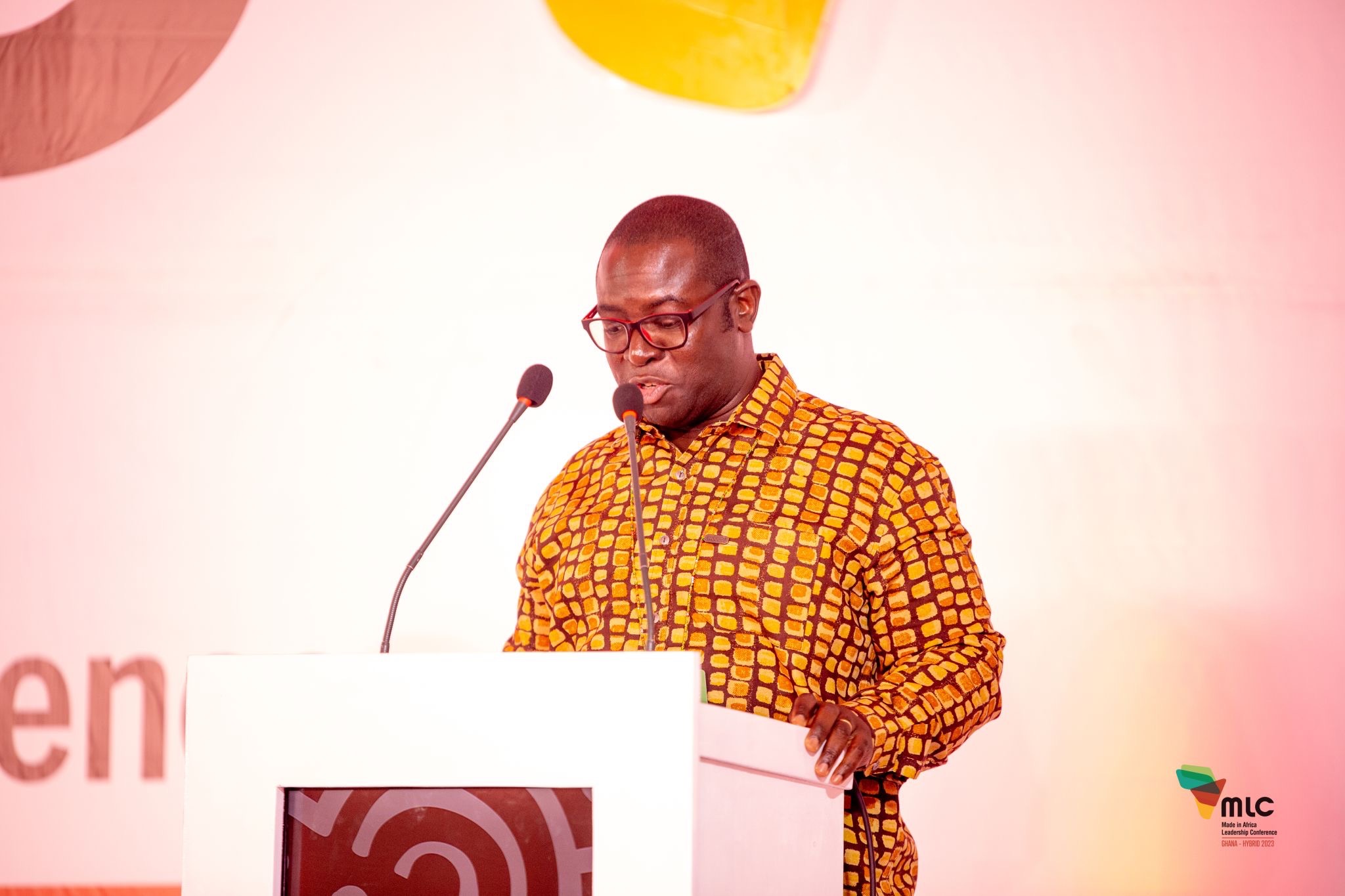
Sans Leadership–So Much to Lose, Too Much to Lose.
The following was shared as a TED-like talk to open the Made in Africa Leadership Conference by BCA Leadership on June 14 at the Marriot Hotel, Accra, Ghana.
My uncle died. My mom’s youngest brother. He came over to Ghana from the United States, where he had lived for decades, and fell ill. He died in the very hospital I worked in at the time. In fact, he died on my ward. But I can swear it wasn’t his disease that killed him. It was leadership, or rather the lack thereof. Leadership is too important for doctors not to have it.
Some of the most important things in life are not taught in school, like leadership. When some of my friends from university got into government I did exhort them: “Nobody taught us Jack about leadership. LEARN LEADERSHIP! CONTRACT COACHES! Leadership is not just caught; it is taught.” Did they listen? Ha!
Ironically, communal, national, continental or even global leadership, is a deeply person-al thing. It takes deeply transformed leaders to deeply transform society. Authentic leadership begins with aligning what goes on in a leader’s head and heart with True North. Leadership principles or True North are no respector of persons—red or yellow, black or white.
Two days from now, we will be officially launching the 20th anniversary celebration of The HuD Group, a holistic leadership organization started by nine young Africans in Accra. From one country in West Africa, it now has presence in 24 countries, on all six continents. Out of Africa to the Rest. From a former Rwandan refugee now in executive leadership in Uganda to a former child soldier in Sierra Leone now a high-ranking bank official in his homeland, to a Chinese-Canadian who we trained via Skype when she was an international medical student in Australia, a lot of transformation and impact has been achieved but in Ghana in particular I feel much of our gains have been eroded by not giving adequate attention to political leadership.
So today is the first of two important occasions this week where I will be drumming home this point with all my heart, liver, spleen and intestines: “Leadership is too important to leave it to politicians alone.” AND with 90% of African businesses being SMEs, creating 60-80% of our jobs and accounting for 40% of our GDP, what we do here at MLC this week for African leaders and African leadership is wildly important.
When two 14-year old stowaways from Guinea, Yaguine and Foday, froze to death in the landing gear of an Airbus 330 from Conakry to Brussels, they had on them a hand-written letter labelled: IN CASE WE DIE… to the Messrs. members and officials of Europe.
They said, among other things, “We have the honor and pleasure and great confidence in you to write this letter … we appeal to your solidarity and kindness for help in Africa. …we, African children and youth, ask you to create a great, efficient organization for Africa to allow us to progress. …we want to study and we ask you to help us in Africa to study to be like you.”
You should find and read the whole letter here—it will thaw and tear your heart. And that was 24 years ago. Has anything changed?
It’s time for Leadership Made in Africa that makes Africa work for Africans. BEFORE WE DIE. Yes we can, partnering and collaborating to reimagine and reform the Africa that we want! Twende! Let’s go! Let’s do this!
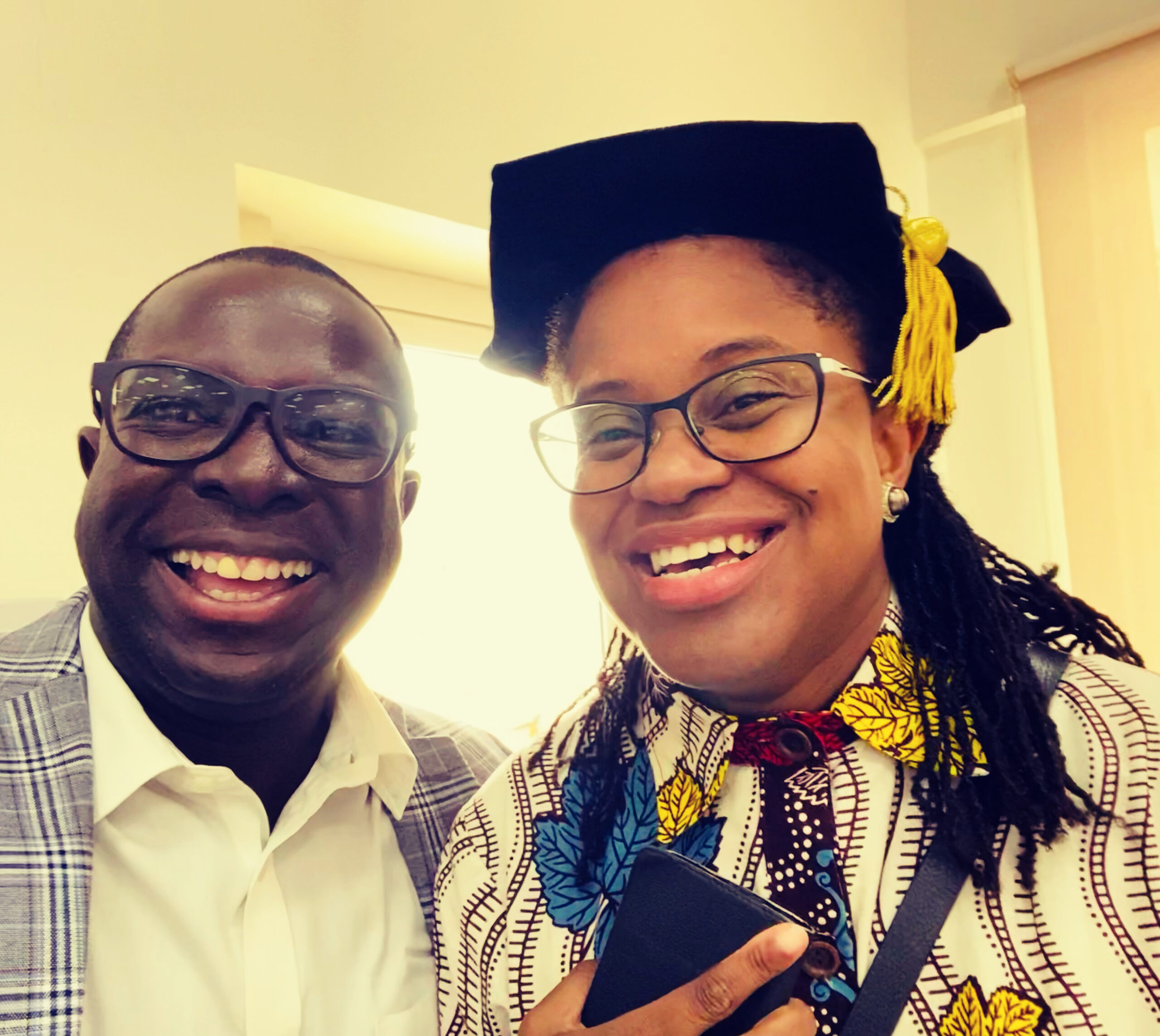
To Compete or To Complete? That is the Question.
Dr. G. Ayorkor Korsah (née Mills-Tettey) and I shared many hearty laughs at the VIP lounge after Ashesi University’s impressively inspiring commencement ceremony last Saturday, June 3, 2023. She is a Senior Lecturer in Computer Science and Robotics, and as department head, Computer Science & Information Systems, she was in her element dolling out degrees to deserving graduates. But we have a 28-year history of rivalry.
This wasn’t our first meeting. Nearly three decades ago, in 1995, we were impassioned opponents. Each of us was part of a trio representing our high schools in the semi-final of the Brillant Science and Maths Quiz on national television. Brillant was what it was called, yes, no typo there. That was the name of the blue bar soap by Unilever that was the title sponsor OF the competition. Much has changed since then. National Science and Maths Quiz, it’s now called. Very appropriate. Prime Time was in its prime, producing this feast of brilliance. They seem to have kept their shine, now in the hands of the next generation of Mensah-Bonsus.
THE LADIES WERE LOVED
Our battle was held and filmed at the Great Hall of the University of Ghana, Legon. Technically, this should’ve been a ‘home match’ for me, in my own territory, since the venue was barely a mile from my home, No. 14 Legon Hill. But no. Everyone was rooting for the über smart all-ladies team from Wesley Girls. Can you blame them? Even now they would be a delight; how much more in those medieval ages of STEM in Africa. Come to think of it, the now-ubiquitous ‘STEM’ term for Science, Tech, Engineering and Math had not even been cooked yet. The STEM acronym was only introduced in 2001 by scientific administrators at the U.S. National Science Foundation (NSF). Girls in Science were hallowed in the 1990s. Even I admired them, but my mission was to win for my school. No distractions.
My Achimota School team was made up of three boys, the three musketeers, although we are the first co-ed public school in the country as far back as 1927 and had science girls who rocked. Needless to say, the competition against the Cape Coast chics was fierce. We had both earned our way to the penultimate in the southern zone.
We inflicted what is arguably the most painful defeat Geyhey has ever suffered at the science and maths quiz. It was veeery close. Even the camera crew were downcast when the celebrity girls lost, visibly disappointed. We made enemies that day. Some couldn’t even hide it.
SOME OTHER LADIES, SOME OTHER TIME
But as it turned out: it’s not the whole word that hated us. Some girls loved us. I was the recipient of umpteen letters of adulation from young ladies all over the country. They happily introduced themselves, sometimes with atrocious photo inserts, and poured their admiration on me—about my intellectual prowess among other things which will distract from the point of this article. Now I’m not sure all of it was appropriate for seventeen.
Even the Weygeygey girls became friends later when things cooled down. After all, “if you can’t beat them; join them,” as they say. That’s how I ended up with the various names in that year group, some of whom became colleagues at the University of Ghana Medical School, as friends. Zanetor Rawlings, first daughter of the then Flight Lieutenant-retired president of Ghana, even visited me in Achimota School at some point. Like me, she would later pursue Medicine too; but in Ireland. I once warned her at a party in Nana Ama Barnes’ home on Legon Campus that if she dared ended up schooling outside Ghana after her revolutionary dad had messed up (yes, teenagers are fearless!) our educational system so, I would be really mad. I guess I’m still mad. A little. She has since returned and been admiringly serving as a Member of Parliament for the Korle Klottey constituency of Accra. In any case, seeing affliction metted out to a certain young man who hang around her at the time, involuntary hair-shaving at the Osu Castle and all, it might have been providence that I stayed at arm’s length.
NOTHING BUT ADMIRATION AND RESPECT
But I digress. Back to the main lady Gertrude, as we called Ayorkor then. She was and is brilliantly brilliant. We only beat her team by strategy and a stroke of luck. Call it grace, if you like. Those girls were on fire! Ayorkor, after 1995, went on ahead to pack up four degrees including two Bachelor’s, a Master’s and a PhD. Dr. Korsah grew up in Ghana and Nigeria, and as a child, she wanted to be an astronaut and an engineer. Ayorkor didn’t join the majority of us that continued to Ghanaian tertiary institutions but went to Ivy League Dartmouth to major in engineering. She attended Carnegie Mellon University for her doctoral work in computer science, obtaining a PhD in 2011.
Ayorkor Korsah is all-round passionate about the artificial intelligence (AI), robotics, algorithms, and programming courses she teaches on the Ashesi Hill but so is she about expanding robotics education in Africa for every Kofi and Amma. That’s why she co-founded the African Robotics Network (AFRON) over a decade ago with a robotics professor at the University of California, Berkeley, Ken Goldberg.
Anyele my wife and I really found a common sweet spot with Ayorkor last Saturday when we coincidentally discovered our common passion for literacy. Being someone who has shared with the BBC how humans and machines can collaborate and combine their strengths, Ayorkor once, over a dozen years ago, experimented with an automated reading tutor in the quest to improving child literacy in Africa. She has a paper on it in the Information Technologies & International Development journal, vol. 6 no. 2, 2010. We are keen to collaborate with her and her bright Ashesi students at our EdTech company, Perbi Cubs, for bigger, brighter and better outcomes for Africa’s precious cubs.
NOT A BOUT
Ayorkor beat me to full-time lectureship and will most likely beat me again to professorship (she so deserves it). But as she, Anyele and I continued our hearty conversation, including recruiting some of her students to practice what she teaches at our Edtech, we got to know she has two little ones of her own, younger than our last two. And we have seven. We beat her to that, fair and square. She even just married, in light of our sixteenth year, and transitioned from Mills-Tettey to Korsah.
Enough of these beatings! Really we’re all grown now and know, for sure, that life isn’t a race against each other. Nor is it about a bout. Rather than compete like we did in our teens, we now learn to complete one another in our adult years for the greater good—the Good Society. In lockstep, we will keep producing holistic emerging leaders, formally like Dr. Ayorkor Korsah does with degrees at Ashesi and informally and semi-formally like I do at The HuD Group. Ashesi turned 20 last year and we turn the same this year. Patrick Awuah, our mutual founding friend of Ashesi will be keynoting at The HuD Group’s presser on June 16, 2023. I was telling him that maybe I should’ve started a Uni too instead of going the CSO (Civil Society Organization) route. But nay, to each one their own. And we compliment, collaborate and complete each other as we all strive hard and long towards the Africa we want.
And as if by divine design, one of the Presec folks who beat our Achimota team in the finals of the Brilliant Science and Math Quiz 1995 southern zone competition ended up as my Biological Sciences course mate and even my room mate at Legon Hall, University of Ghana. We both competed for the few slots at med school available to our Leviathan-sized cohort and made it–from the same room!
There’s a time to compete and a time to collaborate. For me, to complete and not compete today as professional pals and fellow family framers of the same generation is a no-brainer. Here’s to answering life’s real tough questions and quizzes together. Congratulations, Dr. Ayorkor Korsah, for continually raising the bar.
Post script
And oh, Anyele and Ayikai, Ayorkor’s engineering whiz kid of a younger sister, have been tight friends for a quarter-of-a-century, going way back to their Wesley Girls days.

